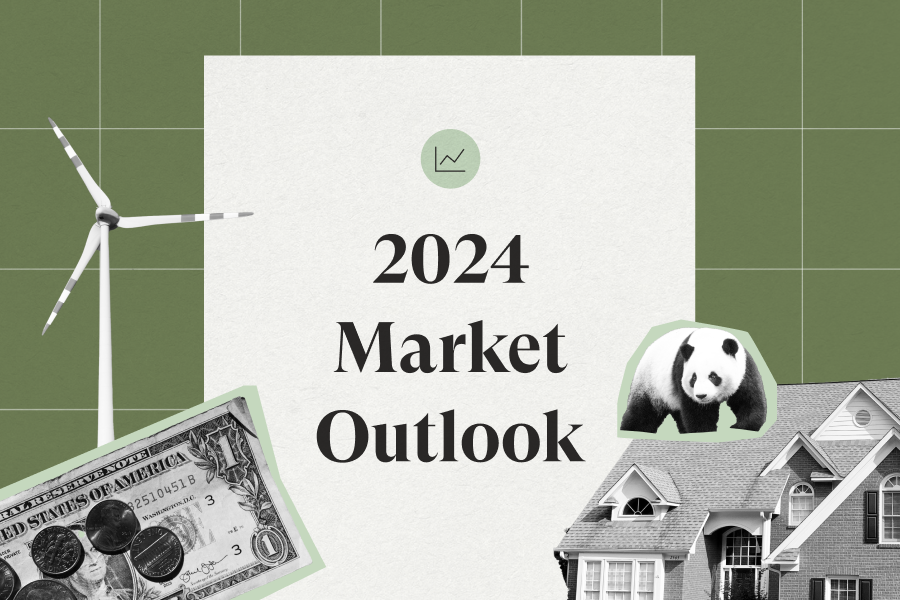2024 Market Outlook: Forget About Predictions
Lower rates, tapering inflation, AI everywhere, and more. Here’s what 2024 may bring, according to Ellevest Chief Investment Officer Dr. Sylvia Kwan.

A couple of weeks ago, an industry colleague asked about my market predictions for 2024, and whether I thought the US economy was going toward a recession or a soft landing. Anyone who knows me well knows I don’t make market predictions. Why? Because markets are impossible to predict and even experts get it wrong. And for 2023, they were dead wrong. My inbox is filled with articles with headlines like “Economists Had a Dreadful 2023,” or “Everyone Got Burned: Wall Street Missed the Great Stock Rally of 2023,” and “How I, and Everyone Else, Got 2023 So Wrong.”
At the beginning of last year, experts predicted that the speed of the Federal Reserve’s rate hikes would help lower inflation but slow down the economy and throw it into a recession. The advice was to sell US stocks and buy US Treasuries. If you acted on that advice, and moved to all Treasuries, you would have ended the year roughly flat.
The US economy proved to be stronger and far more resilient than experts predicted. The S&P 500 ended the year up 24.2%, the DJIA up 13.7% to hit a new record, and the Magnificent Seven fueled NASDAQ up a whopping 43.4%.
I don’t fault the economists and Wall Street experts for getting it wrong. Their predictions were made on the basis of information they had at the time, plus research and analyses, historical context, and troves of data. Predictions are interesting (and fun) but for long-term investors, like we are at Ellevest, they simply don’t matter. Predictions only matter if you use them to take action. If your investment horizon spans many years, what happens in any given year isn’t that important or relevant. What matters is making sure you're invested in a diversified portfolio of investments that together have the ability to perform regardless of whether predictions are right or wrong. As 2023 demonstrates, being wrong can be very costly to your portfolio.
So, what can we expect in 2024?
I won’t try and predict where stocks or bonds or crypto will end up. I’ll leave that to the experts. I even posed the question to ChatGPT, because what could be more 2024 than that? Here’s the bot’s answer:
I'm sorry, but I cannot predict future market movements. The stock and bond markets are influenced by a wide range of factors, including economic indicators, geopolitical events, and market sentiment, which are highly unpredictable. Investment decisions should be based on thorough research and analysis, and it's often recommended to consult with a financial advisor for personalized advice.
Prudent advice indeed.
On a more practical note, here are a few things to look forward to in 2024:
- Lower rates
The Fed has signaled at least three rate cuts in 2024. Markets are already pricing in at least five 25 basis point (0.25%) cuts next year. Decreasing rates are generally good for stocks, bonds, housing, and a multitude of other asset classes. But if what the Fed actually does isn’t as frequent or extensive as what’s expected (and priced into the markets), that could be a negative surprise.
- Tapering inflation
Inflation is heading closer to the Fed’s 2% target. The core personal consumption expenditures price index (PCE) rose by an annual 2.6% in November, a little lower than predicted.
- AI everything everywhere
The potential of AI to revolutionize how we work, manage our finances, and monitor our health, and to pretty much integrate into nearly every aspect of our lives, is no longer the stuff of science fiction. Companies are racing to adopt AI to cut costs, increase efficiencies, and generate better outcomes. Investment dollars, particularly in venture, will continue to pour into AI and AI-related technologies and services, despite concerns around safety and abuse.
- Accelerating energy transition
Solar and wind power are now the cheapest sources of electricity generation, making renewable energy assets and investments not just environmentally friendly but economically compelling as well. The Inflation Reduction Act (IRA) is driving record investments in clean energy through a number of tax and other incentives. Add in federal and state mandated policies and corporate goals, and you have a recipe for a boom in renewable energy investments.
- Easing US-China tensions
US-China tensions will improve when new pandas — those adorable envoys of friendship — are sent from China to the US. (OK, this one is more wishful thinking.)
Now, what about that soft landing?
The answer I gave when asked was that I didn’t think the economy would have a fluffy-feather-filled-marshmallowy-pillow-soft landing. Rather, I think it might be closer to a memory-foam-pillow landing, one that adapts firmly to match the pressures against it and conforms to whatever is on it. It’s not soft or hard, but flexible and yielding. That’s my nod to the resiliency of the US economy, its workforce, its consumers, the markets, and the innovation economy.
Whatever pressures lie ahead — and there’s no way to predict what those will be — the economy can adjust, perhaps with some help from the Fed, or even new technologies like AI that increase productivity and lower costs. It might feel uncomfortable, maybe even a little painful, but with time the economy will adapt and carry on.
Wishing you a healthy, happy, resilient 2024.
Connect with our all-women team of Ellevest Private Wealth Management financial advisors and read more about how we’re here to support you with all aspects of your wealth.
About Ellevest
Founded in 2014, Ellevest is a women-founded, women-led financial services company dedicated to closing the gender wealth gap. Our mission is to get more money in the hands of women, their families, and the next generation through personalized, intentional wealth management, and financial planning.










